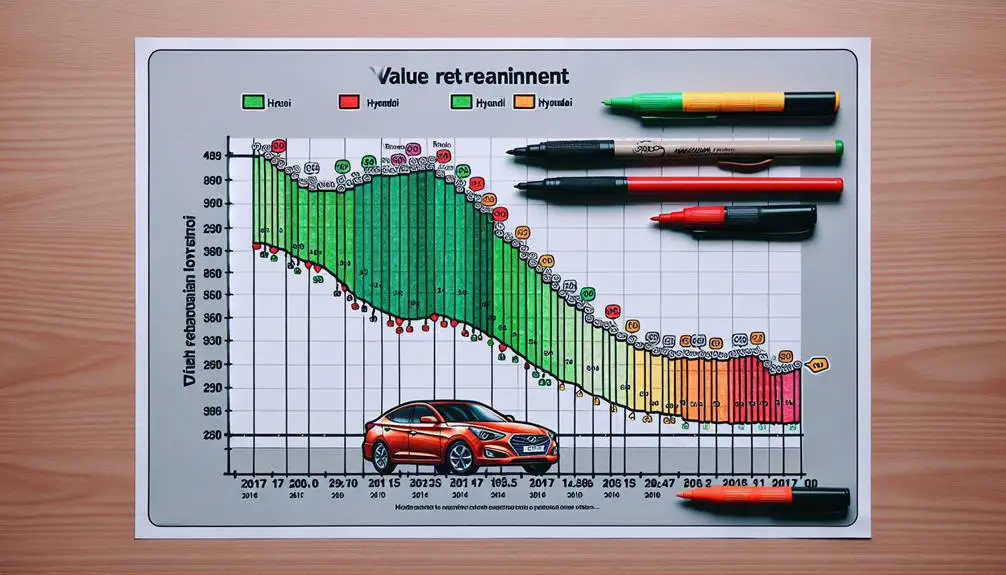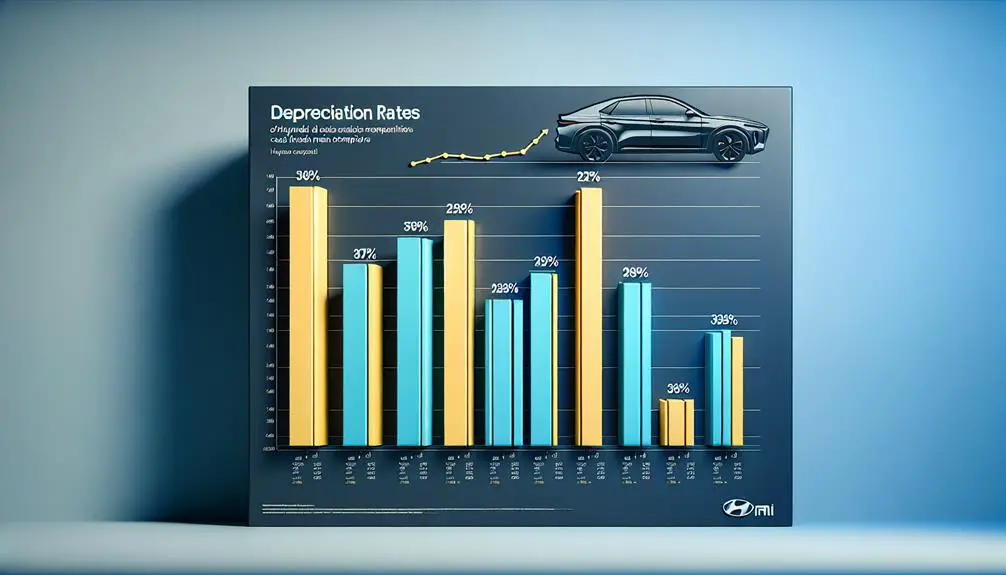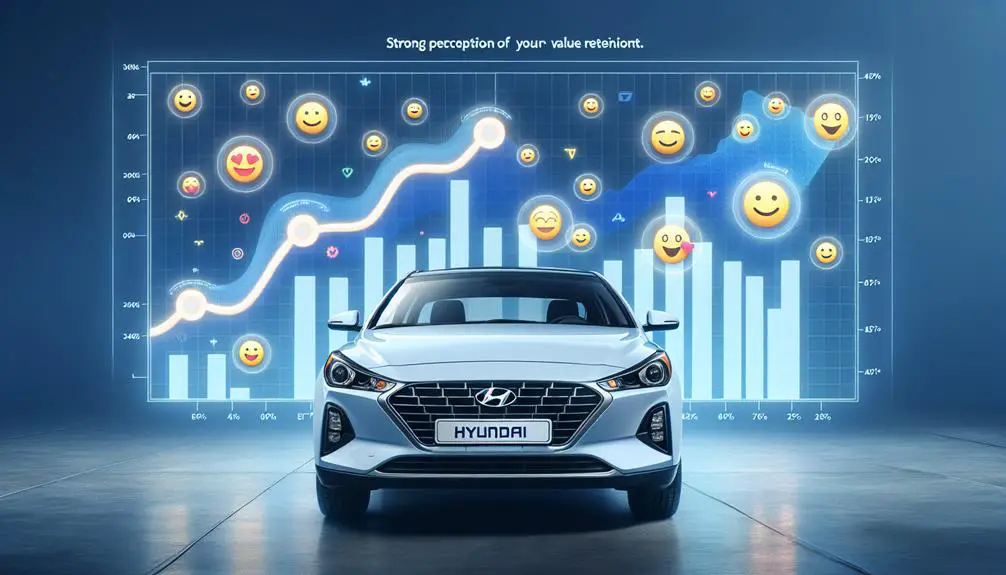Hyundai vehicles generally hold their value well, considering factors like technological advancements and brand perception.
This exploration is crucial for decision-making if contemplating a Hyundai for your next vehicle purchase.
Let's delve into this inquiry together.
Understanding Depreciation

Before diving into Hyundai's value retention, it's vital to grasp how depreciation impacts a vehicle's worth over time. Depreciation is the gradual loss in value of a vehicle from the moment you drive it off the dealership lot. It's influenced by several key factors, which you'll need crucial to fully comprehend this process.
Depreciation factors include the vehicle's brand, model popularity, reliability, and the number of miles driven. For instance, cars that are known for their durability tend to depreciate at a slower rate. Ownership costs, encompassing maintenance, fuel efficiency, and insurance expenses, crucial play a fundamental role. A car that's cheaper to maintain and insure typically retains more of its value over time.
Understanding depreciation is vital when you're evaluating a Hyundai's long-term value. It's not just about how much you'll pay upfront but also about how much you can expect to recoup when it's time to sell or trade in. This insight helps you gauge the true cost of ownership, ensuring you're making an informed decision beyond the initial purchase price.
Hyundai's Market Performance
Comprehending how depreciation affects a vehicle's value sets the stage to investigate Hyundai's standing in the market. When you explore the sales trends and market share, a clear picture emerges, highlighting Hyundai's market performance in a competitive landscape.
Hyundai's resilience and adaptability are evident in its ability to maintain a strong market presence. Sales trends over recent years exhibit a trajectory that not only withstands economic fluctuations but also capitalizes on them. This is no small feat in an industry as volatile as the automotive sector. Hyundai's market share, in particular, tells a story of growth and strategic positioning.
Consider these points:
- Hyundai consistently introduces models that align with consumer preferences, influencing both sales trends and market share.
- The brand's focus on sustainability and technology innovation resonates with a growing segment of eco-conscious buyers.
- Hyundai's warranty and customer service programs enhance buyer confidence, contributing to repeat business and loyalty.
- Market share gains in key segments underline Hyundai's effectiveness in meeting diverse consumer needs.
These factors combine to paint a picture of Hyundai as a brand that not only understands market dynamics but excels in adapting its strategies to maintain and enhance its value proposition.
Comparative Analysis With Competitors

To assess Hyundai's market position accurately, it's critical to compare its performance with that of key competitors, focusing on metrics like resale value, market share, and innovation. You'll find that Hyundai has made significant strides, primarily through aggressive warranty offers and consistent improvements in vehicle quality which have positively impacted its resale trends.
Here's a comparative analysis:
| Brand | Warranty Comparison | Resale Value Trends | Market Share Growth |
|---|---|---|---|
| Hyundai | Industry-leading | Positive | Steady Increase |
| Toyota | Competitive | Strong | Stable |
| Honda | Competitive | Strong | Slight Increase |
| Ford | Average | Variable | Declining |
| Chevrolet | Average | Variable | Declining |
Hyundai's warranty comparison shows it leading with one of the most extensive offers in the industry, which has bolstered buyer confidence and aided in maintaining more vigorous resale trends than many competitors. While Toyota and Honda present strong resale values and market share stability, Hyundai's warranty advantage and focused innovation efforts position it favorably for continued growth. Ford and Chevrolet, meanwhile, have seen more variable resale trends and declining market shares, highlighting Hyundai's competitive edge in the current automotive landscape.
Impact of Technological Advancements
Hyundai's integration of advanced technology has greatly enhanced its vehicles' value retention and appeal in the competitive market. By prioritizing innovation, Hyundai guarantees its lineup isn't just up-to-date but also future-ready. This forward-thinking approach has a direct impact on how well Hyundai vehicles hold their value over time.
Let's explore how technological advancements contribute to Hyundai's standing:
- State-of-the-art Safety Features: Hyundai's commitment to safety is evident in their inclusion of advanced safety technologies. These aren't just bells and whistles; they're life-saving tools that buyers are increasingly seeking.
- Future Innovations: Hyundai isn't resting on its laurels. The company's investment in research and development signals a commitment to future innovations, keeping their vehicles at the forefront of technology.
- Smart Connectivity: In a world where staying connected is more crucial than ever, Hyundai's smart connectivity options make sure that drivers and passengers can seamlessly integrate their digital lives with their on-road experience.
- Eco-Friendly Options: With a growing range of hybrid and electric vehicles, Hyundai is meeting the demand for eco-friendly transportation options, which not only appeals to environmentally conscious buyers but also contributes to the brand's long-term value retention.
Brand Perception and Value Retention

Brand perception greatly influences Hyundai's ability to retain value over time, with consumer opinions shaped by the company's consistent delivery of innovative and reliable vehicles. This positive image enhances brand loyalty, a critical factor in maintaining high resale values. As you explore further, it's evident that Hyundai's strategic focus on quality and customer satisfaction has paid off, translating into a strong secondary market demand for its vehicles.
Furthermore, Hyundai's exceptional warranty benefits play a significant role in enhancing the brand's value retention. Offering one of the industry's most thorough warranty packages, including a 10-year/100,000-mile powertrain warranty, Hyundai not only reassures you of their vehicle's reliability but also underscores their commitment to customer service. This assurance reduces the depreciation rate, making a Hyundai a smart investment compared to competitors with lesser warranties.
To summarize, Hyundai's formula for sustaining high resale values hinges on a combination of strong brand loyalty, fostered by delivering dependable vehicles, and the added security of superior warranty benefits. These elements, backed by data, highlight why Hyundai models often outperform peers in value retention, reinforcing the brand's reputation as a wise choice for discerning buyers.
Conclusion
To sum up, Hyundai's depreciation rates are competitive, showcasing its strong market performance against rivals. Technological advancements and positive brand perception substantially contribute to its value retention.
Comparative analysis reveals Hyundai holds its value well, reflecting the brand's commitment to quality and innovation. Ultimately, choosing a Hyundai means investing in a vehicle that's designed to minimize depreciation, ensuring you're making a savvy financial decision that stands the test of time.